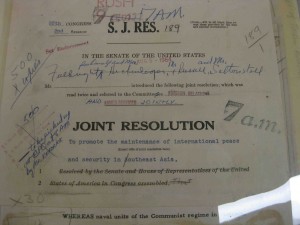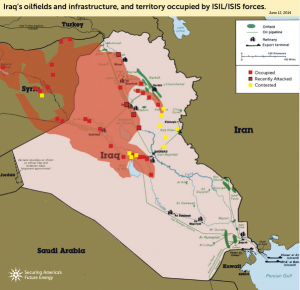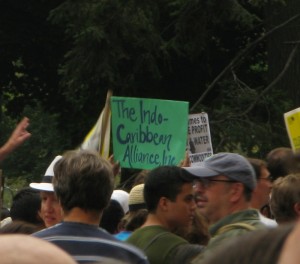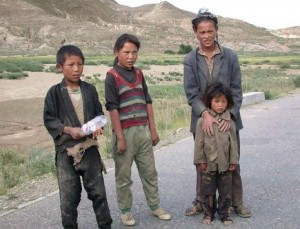Podcast: Play in new window | Download
The Legality of War Powers: Michael Ratner
Law and Disorder co-host Michael Ratner explains war powers in the United States and questions the legality of President Barack Obama decision to launch attacks against the Islamic State using the 2001 Authorization To Use Military Force. Michael Ratner and Jules Lobel with the Center for Constitutional Rights have brought a number of cases challenging the decision to go to war including Vietnam, El Salvador and Grenada
- I’ve spent as a number of us had a lot of our lives trying to restrain U.S. war powers. The U.S. particularly the president or the Congress together going to war around the world.
- It’s been a task that has been singularly unsuccessful, starting with Vietnam where we brought case after case. Only at the very end of the war really did Congress finally act to restrict the president after there were secret wars carried out in Cambodia, in Laos, not just Vietnam.
- Right now the president hasn’t asked for any authority from Congress to either bomb targets in Iraq that he claims are Islamic state targets or presumable if they begun it bombing in Syria, again targets he claims that are Islamic state targets. He’s not asked for any authority.
- He has of course had to use some funding that Congress I think will approve if he asks for more. That is not considered giving authority by Congress, just because they fund a war.
- Coming out of Vietnam, Congress did sort of a mea culpa. They said well, the president dragged us into this war, we passed this Gulf of Tonkin Resolution which was this open ended resolution that said the president could do what ever he wanted in Vietnam. He kept fighting the war based on this broad authorization that Congress gave him over a false incident. . .
- The Gulf of Tonkin Resolution you could liken to the authority Congress gave the president to go to war in Afghanistan called the Authorization to Use Military Force.
- (Still back to Vietnam) So Congress passes what’s called The War Powers Resolution. Congress said to itself, we don’t want to be in the situation like Vietnam again.
- The president, yes is required to go to Congress before he can go to war with any country. The framers were very clear, we don’t want a president making war on his own.
- You get to Vietnam and Congress says we’re going to make a special statute. You still need a declaration of war or a special passage by Congress of a statute authorizing war before you can make war. But in just in case the president goes in to a country without getting a declaration from us or a statute allowing it we’re going to say he can only stay in that country for 60 days.
- After 60 days he’s required to pull out all troops from that country.
- There’s never been any compliance with the War Powers Resolution in the history of our country – where after the 60 day clock, the president has pulled out the troops.
- I’ve litigated that with El Salvador when the U.S. sent in “advisors” into El Salvador, we’ve litigated it in Grenada and other places.
- We litigate these on 3 bases. Non compliance of the War Powers Resolution, Secondly non-compliance with the U.S. Constitution which is the Congress has to declare war not the president, and third non-compliance with the U.N. Charter which says there can be no use of force by any member state, unless its self defense or the UN Security Council approves it.
- The problem here isn’t really a problem of law. The problem here is the problem of having a hegemonic imperialist country that dominates the world through force.
- So that turns us back to where we are right now.
- Obama has two justifications – one is the original grant of authority to bomb and go and use force and U.S. troops in Afghanistan called the Authorization to Use Military Force passed shortly after 911 in 2001 which basically said the president could use force to go after the perpetrators of 911, those who harbored them or those who aided and abetted them.
- In the case of the Islamic State they’re at war with has been denounced by al-Qaeda, so they’re certainly not part of a 911 conspiracy at all.
- There’s no question that he’s illegally bombing the Islamic State in Iraq, illegally bombing them to the extent he is in Syria.
Law and Disorder Co-host Attorney Michael Ratner, President Emeritus of the Center for Constitutional Rights (CCR), a non-profit human rights litigation organization based in New York City and president of the European Center for Constitutional and Human Rights (ECCHR) based in Berlin. Ratner and CCR are currently the attorneys in the United States for publishers Julian Assange and Wikileaks. He was co-counsel in representing the Guantanamo Bay detainees in the United States Supreme Court, where, in June 2004, the court decided his clients have the right to test the legality of their detentions in court. Ratner is also a past president of the National Lawyers Guild and the author of numerous books and articles, including the books Who Killed Che? How the CIA Got Away With Murder, The Trial of Donald Rumsfeld: A Prosecution by Book, Against War with Iraq and Guantanamo: What the World Should Know, as well as a textbook on international human rights.
———
The People’s Climate March and the United Nations Climate Summit
We hear the voices from the climate march held in New York City, a large-scale activist event to advocate global action against climate change. The march winded through the streets of New York Sunday, September 21, 2014. Initially called by 350.org, the environmental organization founded by writer/activist Bill McKibben, the march has been endorsed by nearly 400 organizations, including many international and national unions, churches, schools and community and environmental justice organizations. The action is intended to coincide with the UN Climate Summit this week as U.N. Secretary General Ban Ki-moon invited leaders of government, the private sector and civil society to arrive at a long term solution for climate change.
——–
Last month the National Immigration Project of the National Lawyers Guild and several other groups sued the federal government to challenge its new and unlawful “fast-track” expedited removal policies that are being used against mothers and children detained in Artesia, New Mexico. Artesia is a remote detention center hundreds of miles from the nearest city. Lawyers with the NIP have collected evidence showing the government disregarding and pushing mothers and children through a deportation process making it nearly impossible for them to consult attorneys, prepare claims for asylum or any defenses to deportation. A class action lawsuit was brought by the Northwest Immigration Rights Project challenging the treatment of unaccompanied children in California with the average of 10 years old.
- Starting in early April the government began to see a surge in arrivals of families – of mothers and children and sometimes children who came by themselves.
- Predominantly these children and families come from countries Honduras, Guatemala and El Salvador.
- They fled their home countries for a variety of reasons, mostly to escape what was horrific atrocities they experienced.
- They went to other countries as well, since other countries have seen a 700 percent increase in asylum claims. Costa Rica and Bolivia.
- The surge is not new. The surge actually began about 5 years ago when people were reporting an exponential increase of children coming across the border and no one knew what to do about it.
- From the stories we’ve heard from many of our members they are fleeing horrific atrocities and came to the United States to seek refuge here.
- The National Immigration Project of the National Lawyers Guild and the ACLU and a number of organizations sued the federal government to challenge its policies that denied a fair deportation process to the families and the children who fled this extreme violence.
- The primary focus of our argument is that these people weren’t given a chance to apply for asylum.
- We are violating our laws that relate to asylum, that relate to the convention against torture. These are laws not only in the United States but also international treaties that we’ve signed onto.
- If you fled a country that abused you and injured you, you would come to the United States border. At that point our laws set up a process called expedited removal. It’s a two stage process.
- The first step includes an interview with asylum officer to evaluate if you have a credible fear. When I say border that’s at any point of entry in the United States.
- Anywhere within 100 miles of the border (U.S.) because that’s how we define the border.
- Two thirds of the population of the United States lives within 100 miles of the border.
- Artesia New Mexico is a federal holding cell for the 672 people who are now detained there.
- If you’re a child that doesn’t have an adult with them you’re supposed to be treated differently under this process. They are not as a practice supposed to be put into expedited removal because of their age. You will have a chance to apply for asylum ( which is incredibly difficult) because you apply without an attorney.
- There are children in New Jersey, Washington state, Texas, L.A., and Florida.
- Children can’t always talk if they were raped or recruited into a gang or brutalized by a gang.
- J.E.F.M. v. Holder
- The irony of this whole process is that Artesia is in New Mexico. The immigration court that’s holding these hearings around Artesia is in Arlington, Virginia.
- They’re conducting these hearings by video.
Guest – Paromita Shah, associate Director of the National Immigration Project. She specializes in immigration detention and enforcement. She is the contributing author and co-presenter of the Deportation 101 curriculum.
———————————————————-





